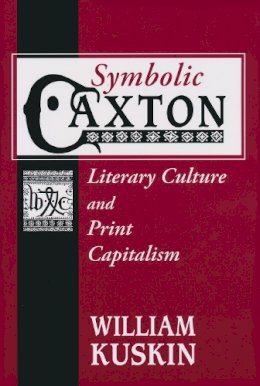William Kuskin is associate professor of English at the University of Colorado, Boulder. He is the editor of Caxton’s Trace: Studies in the History of English Printing (University of Notre Dame Press, 2006).
"There are certainly recent books on Caxton, but none that takes the literary approach used here, which is what makes the book such an important contribution to the field. It serves as a solid introduction to the subject of printing in England in the fifteenth century. William Kuskin shows how print, through a 'logic of reproduction,' constructs and shapes its audience." —Maura Nolan, University of California, Berkeley “This elegant, closely-argued study is one of the most important books to have yet appeared on Caxton and fifteenth-century English literary culture. Kuskin’s fine-grained attention to book history, his allegiance to the conceptual methodology of ‘history of the book’, and his command of literary history all combine to reconfigure our view of early print production, patronage, commerce, and literary authority. This is a major contribution to the history of vernacular textual production and vernacular knowledge in the fifteenth century—and to media history as a whole.” —Professor Ruth Evans, The University of Stirling “This is an important book about the origins of printing and print culture in England by North America’s leading younger scholar of William Caxton. It will contribute to debates about the English fifteenth century and the nature of Chaucerian reception. And it will offer a productive qualification and, at times, corrective to larger and more general accounts of print history.” —Seth Lerer, Avalon Foundation Professor in the Humanities, Stanford University “Thoughtful interpretation is not as common or ambitious as it should be in the studies of the history of the book or of Caxton’s work, and so Kuskin has done something useful and enjoyable. I enjoyed being made to think about capital and being made to think about the big picture in relation to Caxton. And I hope that this book inspires others to research and think in this vein.” —Studies in the Age of Chaucer “Kuskin’s Symbolic Caxton offers an important and thorough reading of Caxton that considers the importance of examining the historical nature of English literary culture along with the symbolic forms that same culture took as it developed.” —Arthuriana “The 2006 anthology of essays he edited, Caxton's Trace: Studies in the History of English Printing, articulated some implications of 15th-century printing. Kuskin presents a companion volume exploring the dynamic nature of culture during the last quarter of the century, which he finds less thoroughly studied than other literary periods.” —Research Book News “William Kuskin’s new study of Caxton’s career, and his significance in English literary history, grows directly from the essays assembled in his edited collection Caxton’s Trace. . . . Kuskin has read all the relevant literature and is keen to engage with it. His arguments are also enhanced with copious and appealing illustrations.” —Speculum “In Symbolic Caxton, William Kuskin describes the introduction of printing from a material culture perspective and looks at the impact of mass production and patronage on the consumption of Caxton’s books.” —Year’s Work in English Studies “Kuskin's writing is richly associative, animated by an energetic eclecticism of reference. This wide-ranging approach is suited to the book's goals, since the importance of considering all these aspects of books together, of uniting the material and sociocultural history of books with the critical study of the literary texts inside them, is one of Kuskin's central contentions. It is hoped that this conceptually complex and valuable study finds an audience with both literary critics and historians.” —Renaissance Quarterly

